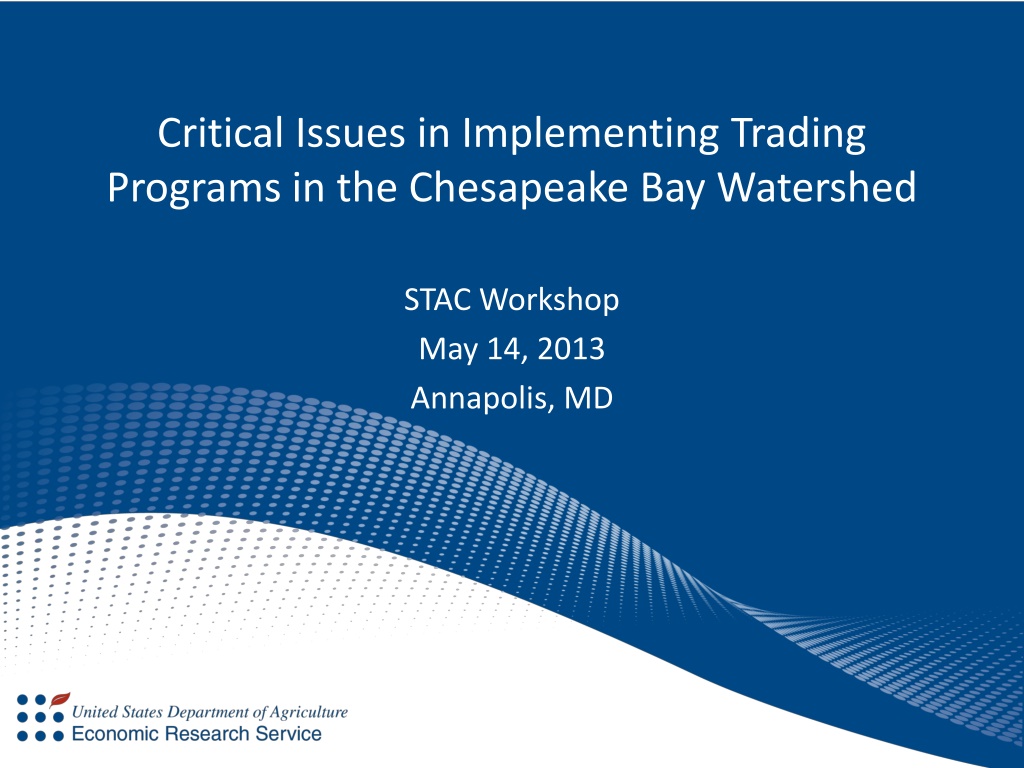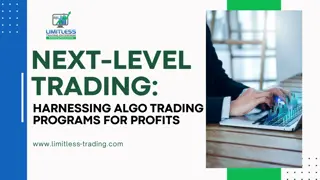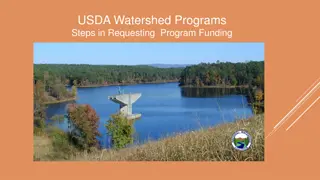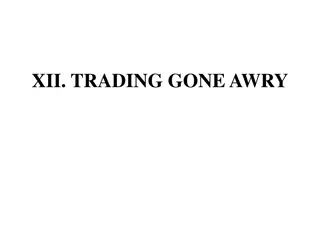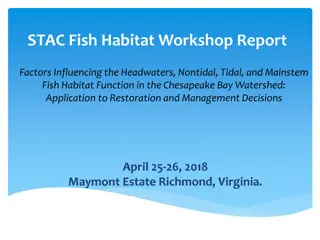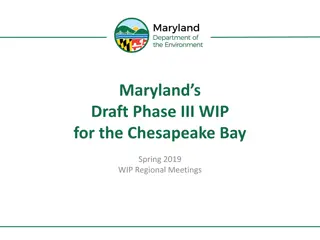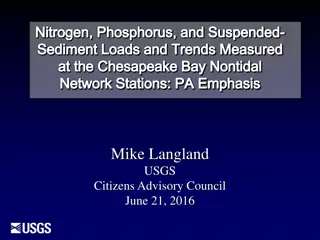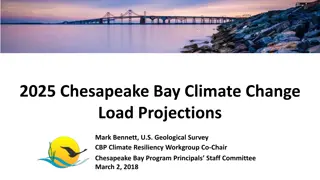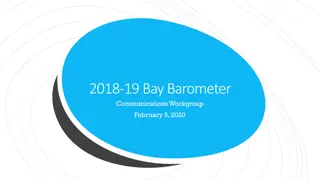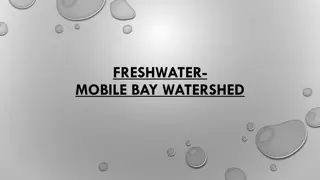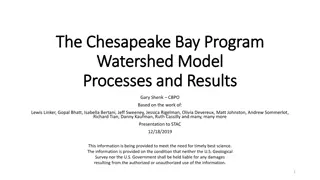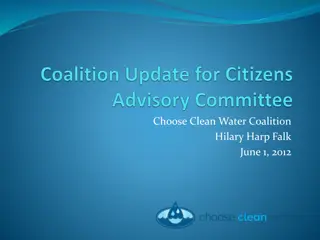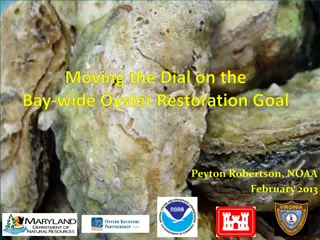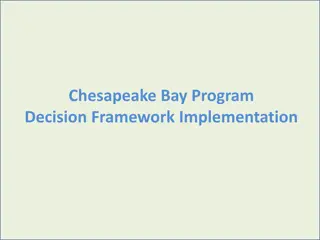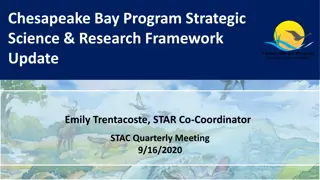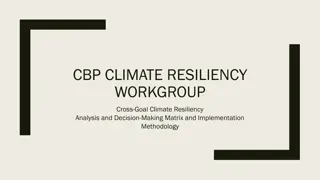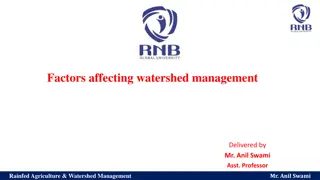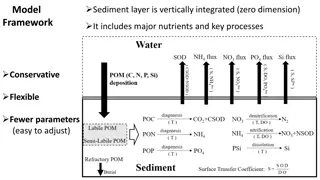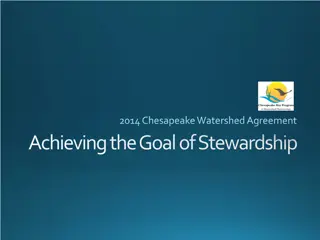Challenges and Recommendations in Implementing Trading Programs in Chesapeake Bay Watershed
Implementing trading programs in the Chesapeake Bay Watershed poses critical issues such as ensuring nonpoint source practices deliver as contracted and selecting proper baselines to affect markets. The workshop highlighted the importance of oversight and conditions for successful PS-NPS trading. Recommendations include focusing on economic benefits, limiting goals, and implementing trading where conditions are suitable.
Download Presentation

Please find below an Image/Link to download the presentation.
The content on the website is provided AS IS for your information and personal use only. It may not be sold, licensed, or shared on other websites without obtaining consent from the author. Download presentation by click this link. If you encounter any issues during the download, it is possible that the publisher has removed the file from their server.
E N D
Presentation Transcript
Critical Issues in Implementing Trading Programs in the Chesapeake Bay Watershed STAC Workshop May 14, 2013 Annapolis, MD
Steering committee Marc Ribaudo - chair Lisa Wainger Charles Abdalla Jim Pease Kurt Stephenson Chris Pyke Matt Ellis Natalie Gardner
Major Issues How do we know that nonpoint source practices deliver as contracted and that water quality is being protected? How does baseline choice affect markets? What are alternatives or supplements to trading?
Invitation only 10 State agency representatives 6 Federal representatives (EPA and USDA) 11 NGO representatives 5 Academic/NGO/Fed Presenters Presentations from 3 Bay states and 1 CBPO representative 6 STAC members (including Steering Committee)
Presentations What have we learned from current trading programs? (Jim Shortle) What have we learned from watershed-scale programs to protect water quality in agricultural watersheds? (Don Meals) Measuring conservation practice implementation and maintenance (Doug Jackson-Smith) Impact of baseline on trading markets and meeting nonpoint source abatement goals (Marc Ribaudo) Summaries of State trading program design (EPA, VA, PA, MD) What s an alternative approach? (Dan Nees)
Workshop summary PS-NPS trading requires many conditions and much oversight to provide expected benefits. Some recommendations to state agencies regarding PS-NPS trading in the context of all policy approaches for reducing NPS loadings to the Bay are:
Focus on the economic benefits of trading Limit PS-NPS goals to reducing the costs to regulated sources of meeting their permit requirements or to offset future growth. Using trading to encourage additional, voluntary nonpoint source abatement (i.e., via stringent eligibility baselines) can be counterproductive to achieving environmental goals.
Implement trading where conditions are right Limit the use of PS-NPS trading to situations where adequate information and financial resources are available to minimize performance uncertainty and to support the administrative requirements for trading.
Validate, validate, validate Validation is a critical step in reducing uncertainty in both trading and traditional conservation programs. When possible, incentivize on-site validation of nonpoint source practices, either through inspections or water quality monitoring (depending on practice).
Alternative approaches may have a better chance of success Explore the use of alternative, performance- based policy approaches for addressing nonpoint source pollution. Voluntary incentive programs may generate more reductions with the same budget through the use of auctions. Existing tools for estimating nonpoint source abatement credits can be used to estimate field- level performance of management practices.
Establishing trust with agricultural community is critical Making use of existing agencies or institutions that have strong ties with farmers, such as soil and water conservation districts appears to key in successful programs. It is important that adequate financial resources be available to support this relationship.
Final thoughts The workshop succeeded in spurring discussions among its participants about some of the issues related to point- nonpoint trading programs Continued dialog between the Bay partners would likely benefit by enabling the sharing of information on what works, what does not, and how understanding of market economics can be used to enhance success of programs. The Trading and Offsets Workgroup was suggested as an appropriate forum for future exchanges. Future workshops could bring in a wider audience of Bay stakeholders to present progress and continue to discuss issues related to trading and other policies for meeting the TMDL goals.
